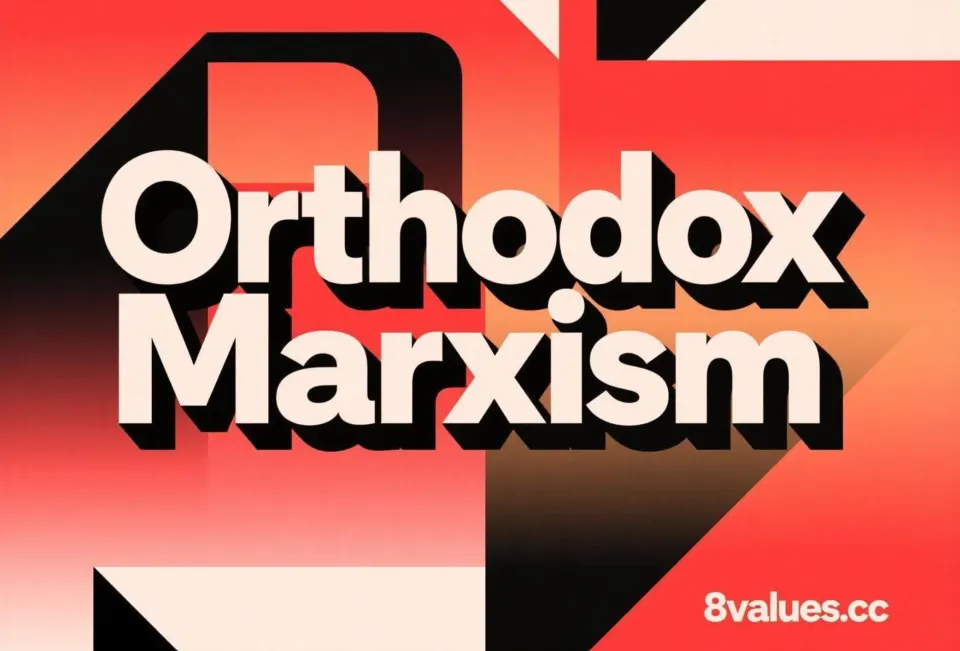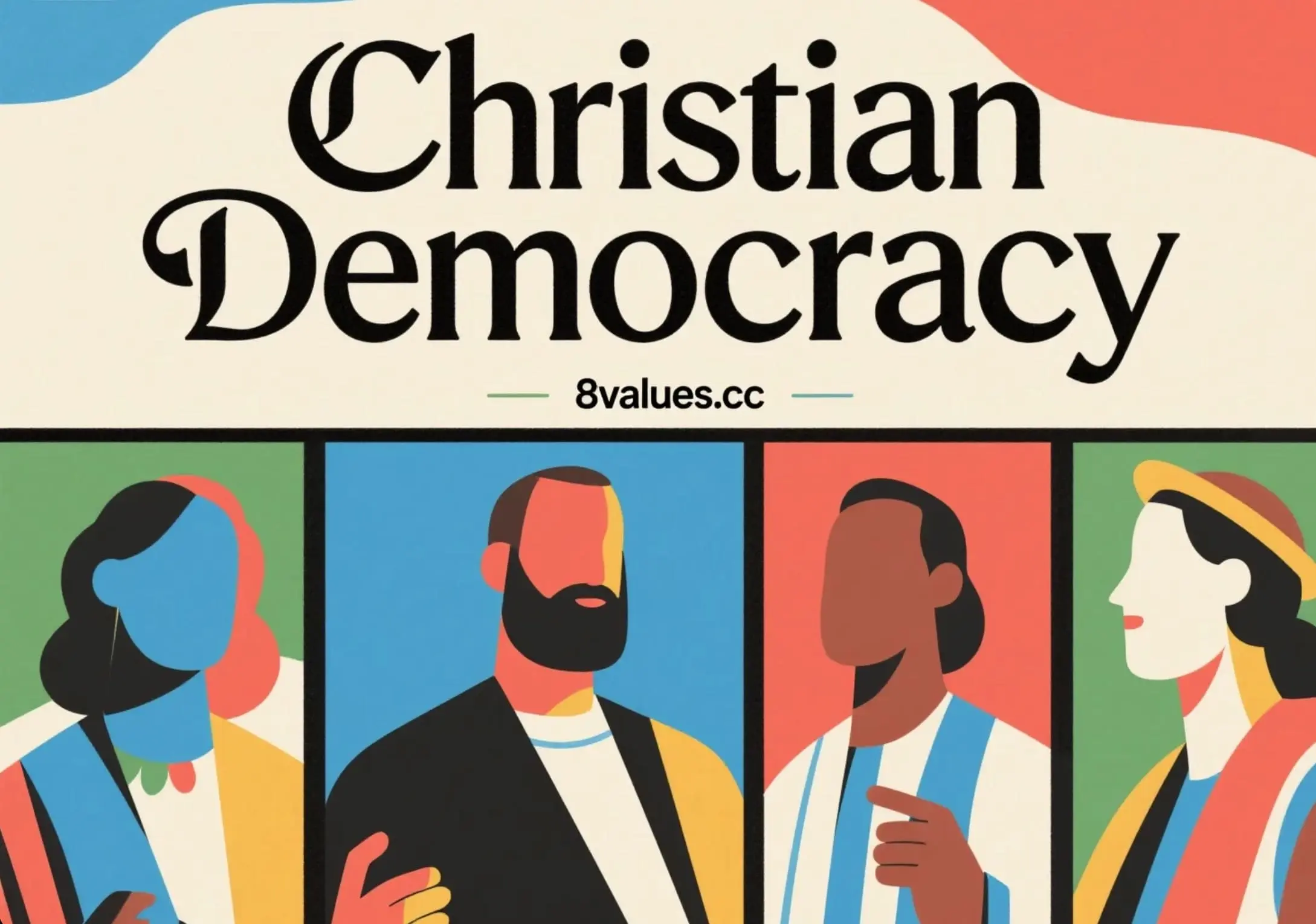The definition, methodology and historical evolution of Orthodox Marxism
Orthodox Marxism is an important branch of Marxism formed after the deaths of Karl Marx and Friedrich Engels. This article will provide an in-depth interpretation of its core methodology - dialectics, explore its main theoretical propositions during the Second International period, as well as the various challenges and reflections it faced in its historical development, and help you better understand the relevant concepts in the test of political values, ideological tendencies.
Orthodox Marxism is an important branch of thought that formed in the international socialist movement after the deaths of Marx and Engels, two famous political philosophers and founders of scientific socialism and Marxism. Before the outbreak of World War I, orthodox Marxism occupied the majority official ideological position in the international socialist movement represented by the Second International.
If you are interested in political value orientation tests under different ideologies, you can try political value ideological orientation tests such as 8Values Politics Test , 9Axes Politics Test or LeftValues Politics Test, which are designed to help users explore their own political positions. This article aims to provide a deep understanding of the important ideology of "Orthodox Marxism".
The Origin and Characteristics of Orthodox Marxism
Orthodox Marxism was founded by the famous theorist Karl Kautsky. It strives to codify and standardize the political theory of classical Marxism by clarifying its ambiguities. Its main goal was to simplify and systematize Marxism along the lines laid down by Marx and Engels.
In practice, the term "orthodox Marxism" is sometimes used to refer to the early Marxism of the Second International era and before it, usually excluding Bernstein's "revisionist" Marxism and Marxism-Leninism.
The philosophical theoretical basis of orthodox Marxism includes the belief that material development (that is, technological progress in productivity) is the only driving force for changes in social structure, human social relations, and social systems (such as feudalism, capitalism). With the development of productive forces, the original system will become contradictory and inefficient, which will trigger some form of social revolution to deal with the increasing contradictions, eventually leading to the emergence of a new economic system.
Debate and attribution of theoretical orthodoxy
In the original meaning of the term orthodox Marxism, "orthodoxy" refers to the use of economic history and dialectical methods. However, the use of the term was controversial, with Trotsky and his followers, Mensheviks and even Bolsheviks all considering themselves to be orthodox Marxists. Some use the term "orthodox Marxism" pejoratively, contrasting it with other tendencies that are seen as "distortions" or "perversions" of Marxism.
In Russia, the most typical social democratic party, the Mensheviks, is considered the "orthodoxy" of Russian Marxism. Georgi Plekhanov, the originator of Russian Marxism, later also became a member of the Mensheviks. The Mensheviks adhered to orthodox Marxist views in theory, but were criticized for not being adaptable and for excessively insisting on moral self-discipline in behavior.
The core essence of Orthodox Marxism: dialectical methodology
Georg Lukács, one of the founders of Western Marxism, put forward a profound view on "what is orthodox Marxism" in his book "History and Class Consciousness". He believes that orthodox Marxism is actually a research method -dialectics.
method not dogma
Lukács believed that orthodox Marxism did not mean an uncritical acceptance of Marx’s research results. It is not a "belief" in this or that argument, nor is it a commentary (or exegesis) on some "holy" book. Instead, orthodoxy refers only to method .
This is a scientific belief that dialectical Marxism is the correct and scientific research method, which can only develop, expand and deepen in the direction laid down by its founder. Lukács emphasized that any attempt to overcome it or "improve" it has and will only lead to superficiality, mediocrity and eclecticism.
Even if new research completely refutes every specific argument of Marx, a serious "orthodox" Marxist can still accept all new conclusions without reservation and abandon all Marx's arguments without even giving up for a moment his Marxist orthodoxy, because orthodoxy lies in method.
The unity of materialist dialectics and reality
Lukács defined materialist dialectics as a revolutionary dialectics . In order to understand its essence correctly, the practical nature of a theory must be developed from its relationship to its object (object). The unity of theory and practice becomes possible only when the emergence of consciousness becomes the decisive step that the historical process must take to achieve its purpose, and only when the historical role of theory consists in making this step actually possible.
Dialectics is a revolutionary method because it insists on the concrete unity of the whole . It reveals that isolated phenomena, isolated groups of facts and separate specialized disciplines (such as economics, law, etc.) are nothing but illusions inevitably produced by capitalism.
If the core meaning of the dialectical method is obscured, it may be seen as a redundant encumbrance. Revisionists such as Bernstein opposed the dialectical method because they wished to establish a thoroughly opportunistic theory, that is, a theory of "evolution" without revolution. Lukács pointed out that by abandoning or obliterating dialectics, history becomes incomprehensible.
Marx and Engels also expressed the core essence of dialectics very clearly: dialectics boils down to the science of general laws about the movement of the external world and human thinking, and these two series of laws are essentially the same . Marx also emphasized that when studying any historical science or social science, one should always grasp the categories to express the fixed form and existential regulations of this certain society.
The main theoretical propositions of orthodox Marxism during the Second International period
The theoretical propositions of Orthodox Marxism mainly revolve around economic determinism, class struggle and the understanding of revolution.
Economic determinism and historical perspective
Orthodox Marxism believes that the economic base unilaterally determines the cultural and political superstructure of society. Some critics view this view as economic determinism . Although Classical Marxism holds that economic factors are not the only decisive factor, orthodox Marxism tends to overemphasize its importance.
This school of thought believes that ideas are dependent on social existence and that production conditions are independent of human ideas. Ludwig von Mises described that orthodox Marxism believes that socialism is the inevitable goal and final result of historical evolution. There is a "historical will" (similar to the absolute spirit valued by absolute idealists), which, like God, leads human beings step by step toward higher social and moral realms, forcing people to think and act according to patterns corresponding to the material basis of their times.
In terms of epistemology, orthodox Marxism is considered to be based on naive materialism, which advocates understanding how history develops by treating people as no different from other material things.
Class consciousness and class conflict
Orthodox Marxism believes that class interests determine thinking patterns . The proletariat living in a capitalist society must think in a socialist way, and the bourgeoisie must think in a capitalist way. Ludwig von Mises pointed out that orthodox Marxism believes that only Marxism is the true science and that all other doctrines (such as classical economics) are tools used by the bourgeoisie to defend capitalism.
Orthodox Marxism tends to ignore conflicts between races and between genders because they believe that focusing too much on these distracts from the real conflict of classes . They insisted that revolutionaries should concentrate on the conflict between classes and that such irreconcilable conflicts would only end when the proletariat succeeded in annihilating other classes.
In addition, in its analysis of the economy, this school of thought believes that human labor is the only source of value and that capital is not depleted. They believe that capitalists simply extract money like rentiers. In terms of the theory of capital concentration, orthodox Marxism believes that under the dominance of capitalism, property will be concentrated in the hands of fewer and fewer people, eventually leading to the collapse of the bourgeois mode of production.
Revolutionary and Transitional Perspectives
In terms of revolutionary methods, orthodox Marxism strongly opposes reformism, which advocates peaceful reforms to improve the capitalist system, and believes that overthrowing the capitalist system is the only way out.
Orthodox Marxism believes that socialist revolution must be the action of the majority , and organizations such as political parties should only be auxiliary forces. This is in sharp contrast to the vanguard theory , one of the basic theories of Leninism.
A key point of orthodox Marxism is that revolutionaries must wait until the capitalist system matures , after the developed capitalist countries (such as the United States and Britain) have exerted their full material productivity and come to an end, before socialism can appear simultaneously around the world. Therefore, they opposed launching a revolution before the capitalist system matured. For underdeveloped countries, orthodox Marxists maintain that even under Marxist leadership, the country must still go through a stage of capitalist development in order to develop productive forces.
Criticism and Reflection on Orthodox Marxism
Orthodox Marxism has faced criticism from different camps in both theory and practice, and these reflections have promoted the further development of Marxist theory.
Criticism from within Marxism
Questioning dogmatism:
- Rosa Luxemburg believed that orthodox Marxism did not dare to develop classical Marxist theory for fear of deviating from Marx's position, which led to the stagnation of the development of Marxism. She believes that Marx’s contribution far exceeds the direct needs of actual class struggle. Only as the movement gradually develops, people need to return to Marx’s ideological arsenal to explore and utilize new parts.
- Some Marxists criticize orthodoxy for ignoring new works on current capitalist developments and treating the writings of Marx and the theorists of his time as immutable holy texts. They believe that this violates the scientific nature of Marxism.
- Vladimir Lenin and later Marxist-Leninists rejected orthodox Marxist views on the timing of revolution and believed that in countries such as Russia where the bourgeoisie was weak, the proletariat must lead the bourgeois democratic revolution.
The turn of Western Marxism:
- Western Marxism, especially the school that developed in Western Europe in the 1920s, attempted to make Marxism more "complex," open, and flexible. Western Marxists such as Lukács, Karl Korsch, Antonio Gramsci, and the Frankfurt School began to examine issues such as culture and psychoanalysis outside the realm of orthodox Marxism.
- The early members of the Frankfurt School were social scientists who believed in orthodox Marxism, but in the face of the rise of fascism, they turned to a more critical and negative approach, completing the political transition from Marxist empirical science to critical theory.
Criticism from bourgeois scholars
Criticism of the Austrian School:
- Ludwig von Mises, a representative of the Austrian School, made a sharp attack on orthodox Marxism in his book "Socialism: Economic and Sociological Analysis". He claimed that orthodox Marxism was dogmatic , unscientific and unverifiable .
- Mises believed that followers of orthodox Marxism reduced science to exegesis of the words of Marx and Engels, and that evidence came from quotations and interpretations of these words, thus forming a cult of the proletariat. He pointed out that when revisionists tried to eliminate the grossest errors in Marx's thought, orthodox Marxists regarded them as heretics and purged them. Mises concluded: "Revisionism has lost to orthodoxy, and free thought has no place in Marxism."
Methodological flaws:
- As a historical idealist, Mises strongly opposed the method of predicting historical development by studying the material environment, believing that ideas are the dominant force in human civilization.
- Orthodox Marxism also does not distinguish between value and price. It believes that no matter what price the product can be sold at, the value of the product is the value generated by the human labor involved in producing it.
These criticisms and reflections greatly promoted the later complexity and deepening of Marxist theory.
Analysis of ideological tendencies and the legacy of orthodox Marxism
As an important ideology in a specific historical period, Orthodox Marxism focuses on class, economic structure and dialectical methods. There are significant differences between the orthodox school and later branches of Marxism (such as Marxism-Leninism and Western Marxism) in terms of revolutionary path, theoretical openness, and breadth of understanding of social issues (such as whether to pay attention to issues such as race and gender).
When analyzing ideological tendencies, understanding orthodox Marxism's emphasis on method, that is, "orthodoxy" lies in dialectics rather than conclusions, can help avoid viewing Marxism simply as a set of rigid formulas.
The diversity and complexity of political ideologies today make it more difficult for people to determine where they stand. Through the 8Values political test , 9Axes political test or LeftValues political test , users can compare the compatibility of their value tendencies with other ideologies to gain a deeper understanding of the uniqueness of orthodox Marxism. For more interpretation and discussion of this type of test, you can continue to follow the official blog of this website.






